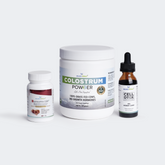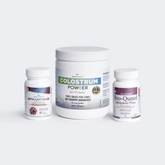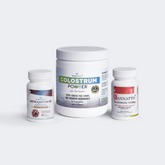How Much Biotin To Take Daily For Hair Growth? The Ultimate Guide
Estimated Reading Time: 9 minutes
|Struggling with thinning hair? You’re not alone. Many turn to biotin, hoping for thicker, fuller locks; but does it actually work? And if so, how much should you take?
Biotin, also known as vitamin H (H stands for Haar und Haut- German words for hair and skin), is a water-soluble B complex vitamin that plays a vital role in promoting healthy hair growth. It fuels keratin production, the protein that makes up your hair, skin, and nails.
Many people swear by biotin supplements for hair growth and preventing hair thinning. But the big question remains: How much biotin should I take daily to see results?
In this article, we will explore the importance of biotin in hair growth and provide insights into how much biotin per day for hair growth. We will also discuss factors that can influence biotin requirements, recommended daily intake, selecting the right supplement, and potential risks associated with consuming an excessive amount of biotin.
So, before you start popping biotin pills, let’s explore its facts and find out what actually works for healthy, luscious locks!
Key Takeaways:
- Biotin is essential for healthy hair growth.
- The optimal daily dose of biotin to promote hair growth is a subject of debate among experts.
- Factors such as age, sex, and underlying health conditions can influence biotin requirements.
- It is crucial to choose a biotin supplement that aligns with your biotin intake requirements for promoting hair growth.
- Consuming excessive amounts of biotin can lead to potential side effects and risks.
What is the Role of Biotin in Hair Growth?
Biotin is essential for our body to convert food into energy, and it also aids in the production of keratin, a crucial protein that makes up our hair, nails, and skin. Research suggests that biotin deficiency can lead to hair thinning and loss.
Because of the key role biotin plays in keratin production, it is often linked to hair growth. However, research suggests that biotin significantly improves hair in people with a deficiency. If you eat a balanced diet, chances are you’re already getting enough from foods like eggs, nuts, and whole grains.
Factors Influencing Biotin Requirements for Hair Growth
Biotin plays a crucial role in promoting healthy hair growth by nourishing hair follicles and supporting the production of keratin, a protein that forms the structure of hair. However, the effective biotin dosage for stimulating hair growth varies based on several factors. Here is what affects your biotin needs:
1. Age & Biotin Absorption
As we age, our bodies absorb nutrients less efficiently, which can lead to lower levels of biotin. This is why older adults may require a higher biotin intake to maintain healthy hair growth. Studies show that older adults have lower levels of biotin in their blood and may require a higher intake of biotin to offset this deficiency.
2. Hormones & Gender Differences
Research suggests that men may need more biotin than women to maintain healthy hair growth. This is because men often have higher levels of DHT (dihydrotestosterone), a hormone that can block hair follicles and lead to hair loss. Biotin can help counteract the effects of DHT and promote hair growth.
Women with PCOS or pregnancy-related hormonal changes may also experience shifts in biotin needs.
3. Underlying Health Conditions
Certain health conditions like digestive disorders (IBS, Crohn’s disease) can interfere with nutrient absorption, including biotin. Individuals with these conditions may require higher biotin dosages to support healthy hair growth.
Understanding how these factors influence biotin requirements can help determine the optimal daily biotin dosage for stimulating hair growth and maintaining healthy hair.
How Much Biotin Should I Take for Hair Growth?
Experts recommend a daily intake of 30 mcg for adults and pregnant women. For breastfeeding women, recommended daily intake of biotin increases to 35 mcg.
However, it is important to note that individual biotin requirements may vary depending on factors such as age, sex, and underlying health conditions. For those with hair growth needs, 2500-5000 mcg per day is the recommended daily intake and deficient individuals may consume up to 10,000 mcg per day but after consulting a doctor.
| How Much Biotin Should You Take?
✔ General Wellness: 30–100 mcg/day (from food sources) |
Note: Consult a healthcare professional before starting on any new supplements, especially if you have underlying health conditions or are on medication. Avoid exceeding the recommended daily dosage.
|
Important Point of Consideration
For optimal results, it is recommended to take biotin supplements with meals to aid absorption and minimize the risk of digestive discomfort. It may take several months of regular biotin intake to notice visible improvements in hair growth and quality. |
What are the Natural Sources of Biotin?
If you’re looking to include biotin through natural sources, a variety of options are available. Incorporating biotin-rich foods into your diet can help maintain healthy hair, skin, and nails, as well as support overall metabolic health. Here are some of the best natural sources of biotin:
-
Eggs: A great source of high-quality protein and biotin. Be sure to cook eggs thoroughly to maximize biotin absorption.
-
Almonds: These nuts are packed with healthy fats, fiber, and biotin, making them an excellent snack for hair health.
-
Sweet Potatoes: A biotin-rich root vegetable that also provides plenty of fiber, vitamins, and antioxidants to nourish the body and promote hair growth.
-
Spinach: A nutrient powerhouse that not only contains biotin but also offers iron, magnesium, and other vitamins beneficial for overall hair health.
-
Avocados: Known for their healthy fats, avocados are a good source of biotin and other essential nutrients that help maintain strong, healthy hair.
-
Salmon: This fatty fish is rich in biotin and omega-3 fatty acids, which help nourish hair follicles and promote a healthy scalp.
-
Peanuts: An affordable and convenient source of biotin, peanuts also offer protein and healthy fats for hair nourishment.
-
Bananas: While they provide a smaller amount of biotin, bananas are a great addition to any diet, offering other important vitamins and minerals for hair health.
-
Cauliflower: This versatile vegetable is a low-calorie source of biotin that can be easily added to a variety of meals to help boost hair growth.
-
Mushrooms: Mushrooms, especially varieties like shiitake and maitake, are good sources of biotin and can be added to meals for extra flavor and nourishment.
|
Food Source |
Biotin Content (per 100g) |
|
Eggs |
10 mcg |
|
Almonds |
60 mcg |
|
Sweet Potatoes |
2.4 mcg |
|
Spinach |
0.5 mcg |
|
Avocados |
3 mcg |
|
Salmon |
5 mcg |
|
Peanuts |
17 mcg |
|
Bananas |
0.2 mcg |
|
Cauliflower |
0.4 mcg |
|
Mushrooms |
7 mcg |
How to Choose the Right Biotin Supplement?
If you’re low on biotin and are looking to support healthy hair, the right biotin supplement can help. But not all supplements are created equal. Here’s what you need to look for:
1. Check the Biotin Dosage:
- For hair health, a dose of 2.5 mg (2,500 mcg) per day is commonly recommended.
-
Most supplements range from 500 to 5,000 mcg.
2. Start Low, Go Slow:
- Begin with a lower dose and monitor how your body responds.
-
Avoid mega doses unless advised by a healthcare professional.
3. Consult Your Doctor:
- A healthcare provider can guide you based on your individual needs, any deficiencies, and your medical history.
4. Choose a Trusted Brand:
- Look for third-party testing, clean labels, and high-quality ingredients.
-
Avoid unnecessary fillers, additives, or artificial colors.
Potential Side Effects and Risks of Biotin Overdose
Biotin is often praised for promoting hair growth and strengthening hair. However, taking excessive amounts of biotin can lead to potential side effects.
The optimal amount of biotin for promoting hair growth varies depending on your age, gender, and underlying health conditions. As per research, excess levels of biotin in the body are rare, but very high doses may lead to:
- Excessive thirst
-
Insomnia (trouble sleeping)
-
Frequent urination
-
Skin rashes
-
Stomach discomfort
Caution: People with certain underlying medical conditions like diabetes, or those who’re pregnant or breastfeeding, need to be careful. Stick to the recommended dose and consult a healthcare professional before supplementing biotin, especially if you have a medical condition or take other medications.
Conclusion
If you're looking to improve hair health, understanding how much biotin to take daily for hair growth is key. While 2,500–5,000 mcg per day is commonly recommended for hair support, individual needs vary. Prioritizing biotin-rich foods like eggs, nuts, and spinach, along with a high-quality supplement, can help maximize results.
Always consult a healthcare professional before increasing your intake to ensure safe and effective use. Stay consistent, nourish your hair from within, and enjoy healthier, stronger hair.
FAQs
Q1. How much biotin to take daily for hair growth?
The optimal daily dosage of biotin for promoting hair growth is typically 2500-5000 micrograms (mcg) per day. However, it is recommended to consult with a healthcare professional before starting any supplement regimen to determine the appropriate dosage for your specific needs.
Q2. What is the role of biotin in hair growth?
Biotin, also known as vitamin B7, plays a crucial role in metabolizing carbohydrates, fats, and proteins, and is essential for maintaining healthy hair, skin, and nails. Biotin also aids in the production of keratin, a protein that is vital for healthy hair. While biotin deficiency can lead to hair thinning or loss, such deficiencies are relatively rare in individuals consuming a balanced diet.
Q3. What factors influence biotin requirements for hair growth?
Several factors can influence an individual's biotin requirements for optimal hair growth. These include age, sex, underlying health conditions, and certain medications. Individuals with specific health concerns should consult with a healthcare professional to determine their appropriate biotin dosage.
Q4. What is the recommended daily biotin intake for healthy hair?
The recommended daily biotin intake for healthy hair for adults and teenagers is typically around 30-100 mcg for adults. However, for individuals looking to stimulate hair growth and enhance overall hair health, a higher dosage of 2500-5000 mcg per day is often recommended.
Q5. How do I choose the right biotin supplement?
When choosing a biotin supplement, look for a reputable brand that undergoes third-party testing to ensure quality and purity. Opt for supplements that provide the optimal amount of biotin recommended for promoting hair growth. It's also important to consult with a healthcare professional before starting any new supplement.
Q6. What are the potential side effects and risks of biotin overdose?
Biotin is generally considered safe, and overdose is rare. However, consuming excessive amounts of biotin can lead to certain side effects such as acne breakouts, digestive issues, and interference with laboratory test results. It is crucial to follow the recommended dosage and consult with a healthcare professional if you have any concerns.
Disclaimer: This blog is for informational purposes only and does not provide medical advice. Always consult a healthcare professional before making changes to your diet or health routine. Individual results may vary.
References:
- Van De Walle, Gavin, and Tess Catlett. "Biotin for Hair Growth: Does It Work?" Healthline, 15 Mar. 2023, www.healthline.com/health/biotin-hair-growth.
- Bergfeld, Wilma, MD. "Does Biotin Really Work for Hair Growth?" Cleveland Clinic Health Essentials, 29 Apr. 2022, health.clevelandclinic.org/is-biotin-as-good-as-advertised-for-your-hair-loss/.
- Chen, Xiao, et al. "Influence of Biotin Intervention on Glycemic Control and Lipid Profile in Patients with Type 2 Diabetes Mellitus: A Systematic Review and Meta-Analysis." Nutrients, vol. 15, no. 2, 2023, https://www.ncbi.nlm.nih.gov/pmc/articles/PMC9659605/.




































